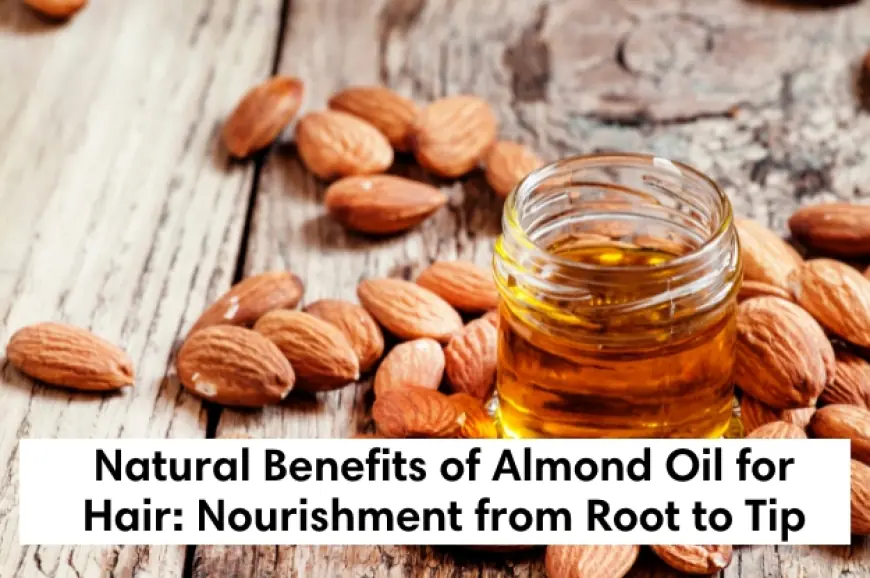The Natural Benefits of Almond Oil for Hair: Nourishment from Root to Tip
Discover the natural benefits of almond oil for hair — from hydration to growth support — and learn how to use it safely for healthier, shinier locks.

In the ever-growing world of natural beauty remedies, almond oil has quietly held its ground as a time-tested favorite — especially when it comes to hair care. Whether passed down through generations or discovered through personal exploration, the use of almond oil for hair has been cherished for its simplicity, versatility, and nourishing effects. From moisturizing dry strands to soothing flaky scalps, this golden oil has earned a place in many DIY routines — and for good reason.
Let’s dive deeper into how almond oil works, what it can do for your hair, and how you can use it in safe, effective ways at home.
What Is Almond Oil and Why It’s Used for Hair
Almond oil is extracted from the seeds of the almond tree, commonly referred to as sweet almonds. Known for its light texture and mildly nutty scent, it’s rich in essential nutrients that are particularly beneficial for hair and scalp health. These include vitamin E, omega-9 fatty acids, and proteins — all elements that support stronger, shinier, and more resilient hair.
Its ability to deeply penetrate the hair shaft and moisturize the scalp makes almond oil especially appealing for those looking for a natural way to restore moisture, reduce frizz, and improve manageability. Unlike heavier oils, almond oil absorbs relatively quickly, which means it can work its magic without weighing hair down.
Key Benefits of Using Almond Oil for Hair Growth and Strength
One of the biggest draws of using almond oil for hair is its reputation for promoting growth and strengthening weak strands. Here's how it helps:
-
Moisturization and Hydration: Dry hair is prone to breakage. Almond oil helps lock in moisture, making strands more supple and less likely to split or snap.
-
Scalp Circulation: Massaging almond oil into the scalp can help stimulate circulation, which in turn supports healthy hair follicles and growth.
-
Rich in Antioxidants: Thanks to its high vitamin E content, almond oil protects the scalp and hair from oxidative stress — a common cause of hair thinning and dullness.
-
Improved Elasticity: Softer, well-nourished hair is more elastic and flexible, reducing the chance of breakage during brushing or styling.
How to Use Almond Oil for Different Hair Types
The beauty of almond oil is that it suits most hair types — but how you use it may vary:
-
For Curly or Coarse Hair: Use almond oil as a leave-in treatment or mix it with a deep conditioner to boost hydration and define curls.
-
For Fine or Oily Hair: Apply a few drops only to the ends of the hair or use it as a pre-shampoo treatment to avoid a greasy look.
-
For Dry or Damaged Hair: Warm a small amount and massage it from root to tip. Leave it in for 20–30 minutes before washing it out.
Start with a patch test to ensure your scalp reacts well, especially if you're trying almond oil for the first time.
DIY Almond Oil Hair Treatments You Can Try at Home
Looking to keep things simple and natural? Try these easy treatments using almond oil at home:
-
Overnight Deep Treatment: Gently massage almond oil into your scalp and hair before bedtime. Cover with a soft scarf or shower cap and wash it out in the morning.
-
Almond Oil & Honey Mask: Mix one tablespoon of almond oil with a teaspoon of honey. Apply to damp hair for 20 minutes to boost shine and moisture.
-
Almond Oil Scalp Scrub: Combine almond oil with sugar and a dash of lemon juice to exfoliate and hydrate the scalp (ideal for dandruff or buildup).
Consistency is key. Even applying almond oil once a week can make a visible difference over time.
Almond Oil for Dandruff and Scalp Health
Many people with flaky, itchy scalps turn to almond oil for relief — and not without reason. Its soothing, anti-inflammatory nature helps calm irritation, while its moisturizing properties combat the dryness that often leads to flakes.
Additionally, almond oil can help gently loosen dead skin, making it easier to remove buildup when shampooing. For better results, warm the oil slightly before applying, and give yourself a gentle scalp massage to help improve circulation and absorption.
Possible Side Effects and How to Use Almond Oil Safely
While almond oil is generally well-tolerated, there are a few things to keep in mind:
-
Allergies: Those with nut allergies should avoid almond oil or consult with a healthcare provider before using it.
-
Build-Up Risk: Overuse of any oil, including almond oil, can lead to scalp buildup if not washed out properly.
-
Patch Test Recommended: Always test a small area before full application to avoid any skin irritation.
Keep your application moderate and frequency balanced — over-oiling your scalp won’t necessarily boost results.
Tips for Adding Almond Oil to Your Hair Care Routine
Ready to incorporate almond oil into your hair regimen? Here are a few gentle ways to get started:
-
Add a few drops to your regular conditioner to boost moisture.
-
Use it as a detangler by rubbing a tiny amount into the ends of wet hair.
-
Mix with other natural oils like coconut or jojoba for a richer blend.
-
Include it in your weekly self-care ritual with a warm oil scalp massage.
Try different approaches and see what works best for your hair type and goals. The key is consistency, not quantity.
Conclusion
From restoring shine to improving scalp health, almond oil for hair is a natural, time-honored remedy that fits seamlessly into modern self-care routines. Its lightweight, nourishing qualities make it a go-to option for those looking to support healthy hair growth, reduce breakage, and address common hair concerns — all without complicated routines or synthetic ingredients.
Whether you use it on its own or as part of a DIY blend, almond oil is a versatile and accessible solution for many hair types. Just remember to keep things balanced, pay attention to how your scalp responds, and enjoy the process of caring for your hair naturally.
What's Your Reaction?
 Like
0
Like
0
 Dislike
0
Dislike
0
 Love
0
Love
0
 Funny
0
Funny
0
 Angry
0
Angry
0
 Sad
0
Sad
0
 Wow
0
Wow
0











































